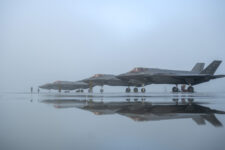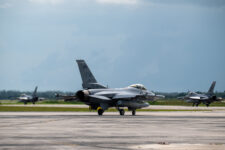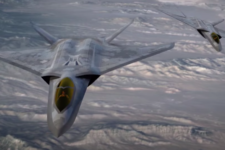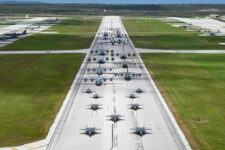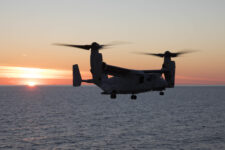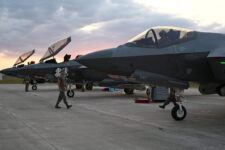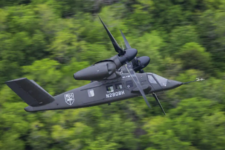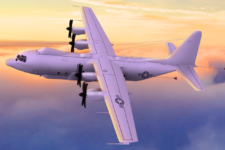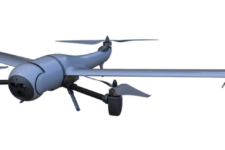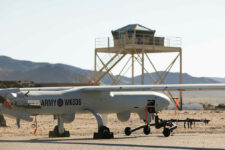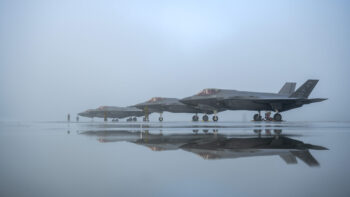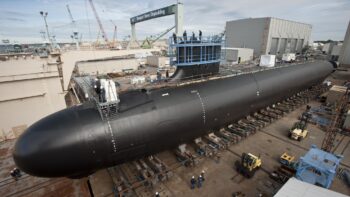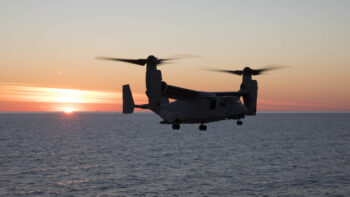
Visitors gather at the ST Engineering pavillion during the Singapore Airshow in Singapore on February 15, 2022. (ROSLAN RAHMAN/AFP via Getty Images)
SINGAPORE AIRSHOW — Singapore’s home defense prime, ST Engineering, largely owns its local market. Now it’s aiming to expand its reach and become a major arms exporter, a key company official told Breaking Defense.
The company, not that well known in the United States, ranks 45th in the Defense News Top 100 list for its $2.17 billion in defense revenue in the 2023 rankings. At last week’s Singapore Airshow, one could be forgiven for thinking ST Engineering is the world’s largest defense company: Its presence was ubiquitous, with significant floor space in the convention center and spotlights on vehicles such as the Terrex S5 Infantry Fighting Vehicle and its new AirFish wing-in-ground effect vehicle.
Chua Jin Kiat, executive vice president for international defense for the company, was hired less than two years ago to boost the company’s defense exports. And a “key selling point” he has hit on in that time is based around how the unique needs of Singapore have driven the company’s interests
“If you’ve got a huge population, why would you need to build the leanest manned frigate in the world? Because the Republic of Singapore Navy demands it,” Chua said. “And when the birth rate has been dropping the way it is, you are looking at a smaller, leaner, meaner, fiercer network digital fighting force that can achieve the mission many times over. So, that is that underlying requirement that the local user has demanded of us. And yes, it has ended up being our key selling point.”
Singapore’s conscript force and shrinking military has driven ST Engineering to ensure “equipment has to be designed to be easy to train, easy to use, because I can’t afford to spend years teaching a guy how to do something well; I’ve got weeks maybe,” Chua said. “And that’s why we are so smart in designing the things that we have. They must be easy to use, easy to train, the training simulators that we have must be the best in the world because you have a new [recruit] audience every three months, every three months.”
Based on the firm’s portfolio, Chua believes there are three key areas where the company could land big wins on the global market.
First are cyber capabilities, with Chua noting the company has contracts to protect 10 of 11 of the city state’s critical infrastructure assets. “I think our cyber business is well placed to offer capabilities to people out there who need to protect their networks, you know, protect them digital infrastructure, and we see a range of interests, from countries in the Asia Pacific, to the Middle East, to Europe,” he said.
Second are ships. “We have built many ships — the Singapore navy, the UAE, and, I think, we are seeing good interests in some of the Middle East markets. Some of the Asian markets,” Chua said. (It’s clear the firm also plans to expand in other domains, given the stars of its showcase this week were the Terrax and AirFish.)
Third is ammunition production, something there is clear global demand for. The company already sells ammo to Britain and Sweden, among other countries. “That’s how we started, making 5.56 ammunition,” Chua noted.
Asked whether the company would look to produce 155mm shells, given the massive demand from the Ukraine conflict, Chua was evasive, saying “We shall see in the very near future … If you’re using up three months worth of shells in a single day, then you know, what you previously thought it was enough for a one month war probably isn’t now.”
Another avenue for the company to cash in may be less flashy but just as lucrative as selling homemade vehicles: MRO work. The company has a large business supplying parts and maintenance for the “planes, aircraft and helicopters from the big primes” that the Singapore Armed Forces use “and they expect us to maintain everything. So over the years, we have gotten really, really good with the Charlie 130s (C-130s).”
As proof of how this could help ST Engineering on a global scale, Chua pointed to a deal signed last year to upgrade and maintain Tunisia’s two C-130Js. “When I see customers from all over the world, because if you’re more than nine hours flying time, might not make sense to fly here,” Chua said. “So they actually fly their planes all the way here.” And that business, he hinted, will soon expand to include platforms that the Singapore military does not currently use.
Of course, nothing is certain for a firm based out of the Indo-Pacific, where Chinese activity threatens to cut off supply chains or induce economic uncertainty at any moment.
Like many others at the show, Chua was quick to note that any conflict (or economic collapse) around China would have direct impact on his business, saying “What we really want is stability. A closed and erratic China could disrupt our supply chains. It would make life pretty hard for us.”
